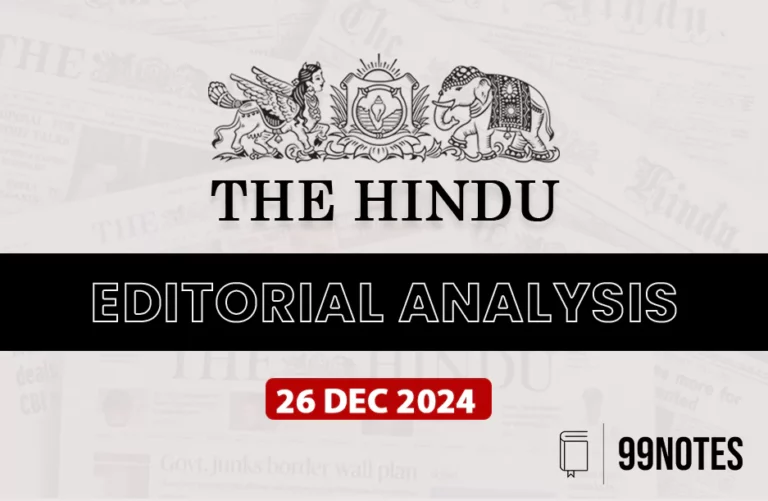22 March 2024 : The Hindu Editorial Notes PDF
The Hindu Editorial
22-March-2024
1. Water, an instrument to build world peace
|
Topic: GS2 – Governance – Government Policies, GS3 – Environment and Ecology The topic is crucial for UPSC as it addresses environmental challenges, government policies, and sustainable development, key aspects of UPSC syllabus. |
| Context |
| ● The article discusses India’s water crisis, emphasizing the importance of conservation measures, government initiatives, and rainwater harvesting for achieving water security and peace. |
Introduction to World Water Day:
- World Water Day, observed on March 22 annually since 1993, is a global initiative supported by the United Nations to raise awareness about the significance of freshwater.
- This year’s theme, “Water for Peace,” underscores the critical role water plays in promoting peace and stability globally.
Water Crisis in India:
- India faces a multifaceted water crisis stemming from rapid urbanization, industrialization, unsustainable agricultural practices, and climate change.
- Factors such as erratic rainfall patterns, water overuse, pollution, and inadequate infrastructure exacerbate the problem.
- According to the World Resources Institute, 17 countries, including India, are under extreme water stress, which could lead to conflicts and unrest.
Challenges and Statistics:
- India’s water availability is already low and expected to decrease further by 2025 and 2050.
- Groundwater depletion is rampant across states like Punjab, Rajasthan, Delhi, and Haryana, reaching alarming ratios.
- Many rivers and streams have intermittent flows or have dried up entirely, impacting ecosystems and water security.
Current Initiatives and Government Programs:
- The government has launched initiatives like the Pradhan Mantri Krishi Sinchayee Yojana (PMKSY) and Mission Amrit Sarovar to address water conservation.
- Emphasis is placed on rainwater harvesting, rejuvenation of water bodies, watershed development, and afforestation.
- However, there’s a need for a comprehensive protocol for the revival of ponds and water bodies.
Importance of Rainwater Harvesting:
- Rainwater harvesting is crucial for augmenting water availability and resilience against scarcity and drought.
- Large-scale rainwater harvesting structures, conjunctive use with groundwater, and safe wastewater reuse are vital for sustainable water management.
Additional Interventions for Water Security:
- Monitoring groundwater levels, reclaiming water quality, and implementing water pricing mechanisms are essential steps.
- A circular water economy, efficient irrigation techniques, and integrated water resource management are necessary for sustainable usage.
- Community awareness campaigns, adoption of low-water requirement crops, and optimal crop planning are crucial for water conservation.
Conclusion:
- Strengthening World Water Day 2024’s theme requires comprehensive strategies to address India’s water crisis.
- Implementing rainwater harvesting, government initiatives, and additional interventions can enhance water security and contribute to a more peaceful world.
- By focusing on these initiatives, India can mitigate its water crisis and move towards a more sustainable and peaceful future.
| Water crisis in India: |
|
Reasons: ● Rapid population growth increasing demand for water. ● Urbanization and industrialization leading to water pollution and depletion. ● Poor water management practices and inefficient use of resources. ● Climate change impacting rainfall patterns and water availability. ● Over-extraction of groundwater for agriculture and domestic use. Challenges to Combat: ● Inadequate infrastructure for water storage, distribution, and treatment. ● Unequal distribution of water resources among different regions. ● Lack of awareness about water conservation and sustainable practices. ● Political and bureaucratic hurdles in implementing effective policies. ● Conflicts over water sharing between states exacerbating the crisis. Way Forward: ● Implementing stringent regulations to control water pollution and ensure sustainable use. ● Investing in water conservation technologies and infrastructure development. ● Promoting community-based water management initiatives. ● Encouraging rainwater harvesting and groundwater recharge techniques. ● Enhancing public awareness through education and outreach programs. ● Facilitating inter-state cooperation and dispute resolution mechanisms. ● Integrating water management into urban planning and development policies. ● Fostering research and innovation for efficient water use and management. Addressing the water crisis in India requires a comprehensive approach involving government intervention, community participation, technological innovation, and sustainable practices across various sectors. |
| PYQ: India is well endowed with fresh water resources. Critically examine why it still suffers from water scarcity. (200 words/12.5m) (UPSC CSE (M) GS-1 2015) |
| Practice Question: Discuss the significance of rainwater harvesting and government interventions in addressing India’s water crisis. (150 Words /10 marks) |
2. Navigating the global waterscape, its challenges
|
Topic: GS3 – Environment and Ecology – Environmental pollution and degradation From the UPSC perspective, understanding water diplomacy, cooperation, and management is crucial for addressing global challenges and fostering peace. |
|
Context |
|
● The article discusses the global challenge of water scarcity, emphasizing the importance of water diplomacy, international cooperation, and sustainable management to address issues such as rural water access, transboundary water governance, and achieving peace and prosperity. |
Introduction
- Global Water Scarcity: Approximately two billion people globally lack access to clean water, with demand continuously increasing, posing threats to basic human needs, prosperity, and peace.
- World Water Day 2024 Theme: The theme for the 31st World Water Day is “Leveraging Water for Peace”, emphasizing the importance of water in fostering peace and prosperity.
Historical Perspective
- Civilizations and Water: Throughout history, water has been crucial for civilizations such as those around the Indus, Nile, Tigris, and Euphrates rivers, but conflicts have also arisen over its control.
- Mesopotamian Conflict: Historical conflicts like the one between the Mesopotamian cities of Lagash and Umma demonstrate the tensions over water resources, resulting in one of the oldest known peace treaties, the Treaty of Mesilim.
Water Diplomacy in Modern Context
- Meteorological Extremities: Current meteorological extremes, including heat waves and floods, amplify concerns about water insecurity due to climate change, affecting regions like India where erratic monsoons impact agriculture and the economy.
- International Cooperation: Improved cooperation over water-sharing and adherence to International Water Law principles are essential to govern shared waters sustainably and promote peace.
- Inclusive Approaches: Water diplomacy requires inclusive approaches involving indigenous and local communities, civil society, and academic networks to prevent and resolve water-related disputes.
Global Water Challenges
- Water Quality Data Shortage: The 2024 UN report highlights a shortage of water quality data globally, particularly affecting rural areas where four out of five people lacking basic drinking water services reside.
Addressing Rural Water Needs
- Rural Water Dependency: In India, 70% of the rural population relies on water for households and agriculture, which accounts for 70% of global freshwater use.
- Positive Outcomes: Increased water investments in rural areas can lead to positive outcomes in health, education, employment, and overall well-being.
- AI in Agriculture: Emerging AI technology in agriculture can enhance water conservation, crop productivity, and sustainability.
Transboundary Water Governance
- Transboundary Waters: Many of the world’s freshwater resources are in transboundary waters, necessitating sophisticated cross-border water governance.
- South Asian Region: Water pollution in rivers like the Meghna, Brahmaputra, Ganga, and Indus has worsened in South Asia, requiring effective cross-border cooperation.
Progress and Challenges
- Cooperation Status: Out of 153 water-sharing nations, only 24 have achieved full cooperation agreements on shared waters, highlighting the need for increased collaboration.
- Importance of Cooperation: Transboundary water cooperation is crucial for achieving the 2030 Agenda and Sustainable Development Goals, benefiting various sectors and ecosystem services.
Conclusion
- Collective Well-being and Peace: Cooperation in sustainable water management is essential for ensuring collective well-being, peace, and achieving global development goals.
|
PYQ: Why is the world today confronted with a crisis of availability of and access to freshwater resources?(150 words/10m) (UPSC CSE (M) GS-1 2023) |
|
Practice Question: Discuss the significance of water diplomacy and international cooperation in addressing global water challenges and fostering peace. (250 Words /15 marks) |
3. Should judges accept official posts after retirement?
|
Topic: GS2 – Indian Polity – Judiciary Crucial for UPSC as it addresses judicial ethics, political neutrality, and reforms vital for maintaining judicial integrity. |
| Context |
| ● The article highlights debates on judicial conduct, post-retirement appointments, and reforms to ensure integrity and independence within the judiciary. |
Judicial Conduct and Political Affiliation:
- The recent case of a former judge of the Calcutta High Court joining a political party after resigning has sparked debates on judicial conduct.
- While there is no legal prohibition, concerns over judicial independence and ethical conduct have been raised.
Reforming Judicial Conduct:
- The need for the Supreme Court to redefine the expected values from judges of superior courts has been highlighted.
- Reinforcing the Bangalore Principles of Judicial Conduct (2002) could serve as a starting point.
Cooling-off Period and Post-Retirement Appointments:
- Suggestions for a cooling-off period after retirement have been made to mitigate potential conflicts of interest.
- Recommendations vary, with opinions leaning towards a cooling-off period of two to three years.
Public Perception and Judicial Integrity:
- Concerns exist regarding public perception of judicial decisions made close to retirement, potentially influenced by post-retirement benefits.
- Post-retirement appointments may lead to doubts about the impartiality of judgments, particularly concerning cases involving the government.
Legislative Action and Judicial Appointments:
- Proposals for central legislation to regulate post-retirement appointments have been suggested.
- The judiciary should take a proactive stance in ensuring transparency and integrity in appointments.
Alternative Solutions and Retirement Age:
- Increasing the retirement age of judges has been proposed as a solution, although concerns about mental and physical faculties have been raised.
- Lifetime appointments, as seen in the U.S., may not be suitable for India due to potential stagnation and lack of fresh talent.
Equal Retirement Ages and Institutional Dynamics:
- Uniform retirement ages for High Court and Supreme Court judges have been advocated to address imbalances in institutional dynamics.
- Disparities in retirement ages can create hierarchical tensions within the judiciary.
Reforming Tribunal Appointments:
- Alternative approaches to tribunal appointments, such as a common service or written test, have been suggested.
- Concerns exist about the potential bureaucratization of judicial roles through standardized testing.
Monetary Perks and Post-Retirement Motivations:
- Increasing post-retirement monetary perks like pensions may not address the underlying motivations for seeking post-retirement appointments.
- Post-retirement jobs are often sought for power rather than financial gain, suggesting the need for broader systemic reforms.
Conclusion:
- In summary, the discussion underscores the complexities surrounding judicial conduct, post-retirement appointments, and the need for reforms to uphold judicial integrity and independence.
| Judges Taking Official Posts After Retirement: |
|
Arguments for: ● Expertise Utilization: Judges bring extensive legal knowledge and experience to their new roles, potentially improving decision-making. ● Institutional Knowledge: Retired judges can provide valuable insights into the workings of the judiciary, aiding in reforms and policy-making. ● Stability: Continuity in governance may be ensured by retaining experienced personnel in official positions post-retirement. Arguments against: ● Conflict of Interest: Former judges may face accusations of bias or favoritism, especially if their new roles involve interactions with the judiciary. ●Judicial Independence: There’s a risk that judges might feel beholden to political or corporate interests if they transition into government or private sector roles. ● Undermining Trust: Public perception of impartiality within the judiciary could be compromised, eroding trust in the legal system. ● Lack of Accountability: Retired judges might operate without the same oversight mechanisms as active judges, leading to potential abuses of power. |
| Practice Question: Discuss the ethical implications of judges accepting political posts post-retirement, and suggest reforms for judicial integrity. (250 Words /15 marks) |
For Enquiry

22 March 2024 : Daily Current Affairs

22 March 2024 : The Hindu Editorial Notes PDF

22 March 2024 : PIB Summary for UPSC

22 March 2024 : Indian Express Editorial Analysis

21 Mar 2024 : Daily Current Affairs Quiz

21 Mar 2024 : Daily Answer Writing

21 March 2024 : Daily Current Affairs

21 March 2024 : PIB Summary for UPSC

21 March 2024 : The Hindu Editorial Notes PDF

21 March 2024 : Indian Express Editorial Analysis
Daily Current Affairs 22 March 2024 : Daily Current Affairs Daily Current Affairs
22-March -2024- Top News of the Day
1. Neuralink’s Breakthrough: Paralyzed…
March – The Hindu Editorial 22 March 2024 : The Hindu Editorial Notes PDF The Hindu Editorial
22-March-2024
1. Water, an instrument to build world peace
Topic: GS2 – Governance…
March 2024 PIB 22 March 2024 : PIB Summary for UPSC PIB Summary for UPSC
22-March -2024
1. International Telecommunication Union elects India as co-chair…
Indian Express 22 March 2024 : Indian Express Editorial Analysis Indian Express Editorial Analysis
22-March-2024
1. IN THE SAME BOAT
Topic: GS2 – International Relations…
Daily Quiz 21 Mar 2024 : Daily Current Affairs Quiz 21 Mar 2024 : Daily Quiz…
mains answer writing 21 Mar 2024 : Daily Answer Writing Mains Answer Writing
21-March-2024
Q1) The growing regulatory burden associated with Information Technology…
Daily Current Affairs 21 March 2024 : Daily Current Affairs Daily Current Affairs
21-March -2024- Top News of the Day
1. India’s Income Inequality Reaches…
March 2024 PIB 21 March 2024 : PIB Summary for UPSC PIB Summary for UPSC
21-March -2024
1. Maiden test-firing of India’s first indigenously-made 1500 HP…
March – The Hindu Editorial 21 March 2024 : The Hindu Editorial Notes PDF The Hindu Editorial
21-March-2024
1. Data marketplaces: the next frontier
Topic: GS3 – Indian Economy…
Indian Express 21 March 2024 : Indian Express Editorial Analysis Indian Express Editorial Analysis
21-March-2024
1. A border runs through it
Topic: GS2 – International…





